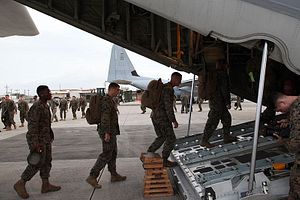Despite years of protest and stalled negotiations, Okinawa Governor Hirokazu Nakaima approved the relocation of the U.S. military’s fiercely debated Futenma Air Station on Friday morning. The decision comes after years of Okinawan opposition to the Marine Corps’ base and the 26,000 troops stationed there. Promises of a generous stimulus package from Prime Minister Shinzo Abe likely sealed the deal.
“You presented surprisingly impressive proposals,” the governor told Abe during a Christmas Day meeting that paved the way for the agreement. “I express my heartfelt appreciation as the representative of Okinawa’s 1.4 million people.”
Abe’s special arrangement was a lucrative one: an annual $2.9 billion for Okinawa’s economic stimulus budget until 2021 and the guarantee that operations at Futenma would cease within five years. He also promised an early return of the land that Futenma currently occupies.
Nakaima signed off on landfill work that will allow a replacement base to be constructed off the shore of Nago – a less densely populated area than Ginowan, Futenma’s current location. The base, which was initially slated to shut down after a 1996 joint agreement between the U.S. military and its host, has become increasingly unpopular with nearby residents.
“The United States affirmed in 2006 it would re-site the base on the coast, but the move has been stymied by opposition throughout Okinawa, which feels overburdened by its outsized share of the American military presence in Japan,” reported AFP.
The October 2012 rape of a young Okinawan woman by two American servicemen raised opposition of the base to a fever pitch. The U.S. military imposed a strict 11:00 pm to 5:00 am curfew for all personnel stationed in Japan – not only Okinawa – in an attempt to quell outrage. Stories of sailors and marines being arrested for trespassing or drunk driving still appear in the Japanese media from time to time.
Last year, Okinawans also protested the deployment of the Marine Corps’ tilt-rotor V-22 Osprey. Critics said that the vertical-takeoff aircraft presented a safety risk to local inhabitants, citing its poor safety record and the close proximity of an elementary school.
Now, it seems that a rare seafaring mammal is the hot-button issue for Futenma’s relocation off coast. Environmentalists claim that the required landfill near Nago would disrupt the local dugong habitat. Dugongs are critically endangered relatives of the manatee. The U.S. Ministry of Defense promised to give “full consideration to the dugongs and minimize impacts of the project as much as possible.”

































